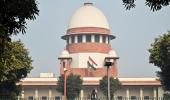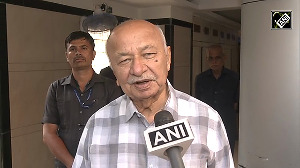Citizens' voices cannot be throttled by a threat of destroying their properties and 'bulldozer justice' is simply unacceptable under the rule of law, the Supreme Court has said.

Observing that justice through bulldozers was unknown to any civilised system of jurisprudence, a bench headed by Chief Justice D Y Chandrachud said the state must follow due process of law before taking action to remove illegal encroachments or unlawfully constructed structures.
"Bulldozer justice is simply unacceptable under the rule of law. If it were to be permitted the constitutional recognition of the right to property under Article 300A would be reduced to a dead letter," said the bench, which also comprised Justices J B Pardiwala and Manoj Misra.
Article 300A of the Constitution says that no person shall be deprived of his property save by authority of law.
The apex court delivered its verdict in a matter related to demolition of a house in Maharajganj district of Uttar Pradesh in 2019.
Holding that the entire process which was followed by the state was 'high handed', the bench directed the Uttar Pradesh government to pay Rs 25 lakh compensation to the petitioner, whose house was razed for a road project, as an interim measure.
"Justice through bulldozers is unknown to any civilised system of jurisprudence. There is a grave danger that if high handed and unlawful behaviour is permitted by any wing or officer of the state, demolition of citizens' properties will take place as a selective reprisal for extraneous reasons," the verdict delivered on November 6 said.
"Citizens' voices cannot be throttled by a threat of destroying their properties and homesteads. The ultimate security which a human being possesses is to the homestead," said the judgement penned by the CJI.
The November 6 verdict, which was uploaded on the apex court website later, said the law does not undoubtedly condone unlawful occupation of public property and encroachments.
The bench said there were municipal laws and town-planning legislation which contain adequate provisions for dealing with illegal encroachments.
"Where such legislation exists the safeguards which are provided in it must be observed. We propose to lay down certain minimum thresholds of procedural safeguards which must be fulfilled before taking action against properties of citizens," it said.
It said the officials of the state who carry out or sanction such unlawful action must be proceeded against for disciplinary action.
"Their infractions of law must invite criminal sanctions. Public accountability for public officials must be the norm. Any action in respect of public or private property must be backed by due process of law," the bench said.
It said before acting in pursuance of a road widening project, the state or its instrumentalities must ascertain the existing width of the road in terms of official records or maps.
The bench said the state must carry out a survey or demarcation to ascertain whether there was any encroachment on the existing road with reference to the existing records or maps.
It said if an encroachment was found, the state must issue a proper written notice to the encroachers to remove the encroachment.
"In the event that the noticee raises an objection with regard to the correctness or the validity of the notice, decide the objection by a speaking order in due compliance with the principles of natural justice," the bench said.
It said if the objection was rejected, state must furnish reasonable notice to the person against whom adverse action was proposed and upon the failure of the person concerned to act, proceed in accordance with law to remove the encroachment unless restrained by an order of the competent authority or court.
"If the existing width of the road including the state land adjoining the road is not sufficient to accommodate the widening of the road, steps must be taken by the state to acquire the land in accordance with law before undertaking the road widening exercise," it said.
The bench said the registrar (judicial) of the apex court shall circulate a copy of its judgment to the chief secretaries of all the states and Union Territories to ensure compliance with the directions issued with regard to the procedure to be followed for the purpose of road widening in general.
"The chief secretary of the government of Uttar Pradesh is directed to have an enquiry conducted into the entire matter pertaining to the illegal demolition, against all concerned officers of the state and the contractors who are responsible for the illegal demolition," it said.
While hearing the matter on November 6, the top court had pulled up the Uttar Pradesh government for the 'illegal' demolition.
"You can't come with bulldozers and demolish the constructions overnight. You don't give the family, time to vacate. What about the household articles inside the house?" the bench had orally told the counsel representing the state government.











 © 2025
© 2025